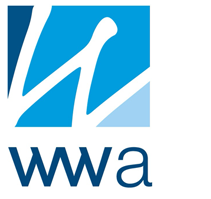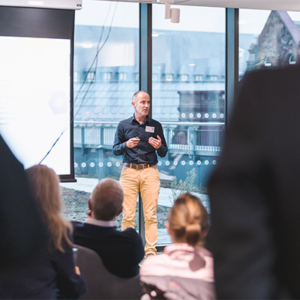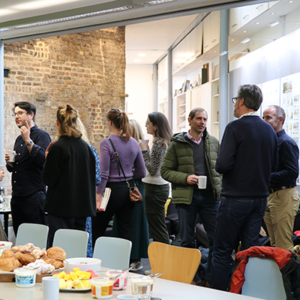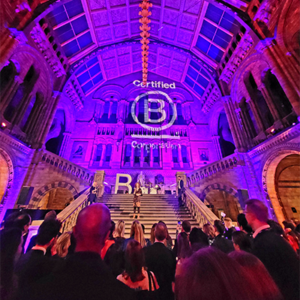
09 Mar B Corp & the Built Environment Working Group
In recent years, there has been a movement in business towards a more collaborative, community and impact-focused approach. One manifestation of this trend is the rise of B Corporations, companies that are certified by the non-profit B Lab for meeting rigorous social and environmental performance standards, and for embodying a commitment to purpose and transparency.
This global movement, initiated in the United States in 2006 has grown significantly and particularly in the period since 2020 where the Covid pandemic and wider macro environmental and economic factors have come to the fore for Governments, businesses and individuals.
At Ward Williams Associates we took the first steps on our ‘B Corp journey’ (you’ll hear this term a lot) in 2019 after finding out more on the aims, objectives and impact opportunities for People, Places and Planet from fellow Cornish-based businesses in the creative sector. So, what is it all about and how does this link to the sometimes-traditional-thinking construction and built environment sector?
At the heart of the B Corp ethos is a belief in the power of collaboration to create positive change. B Corps recognise that they cannot operate in isolation, and that their success is deeply intertwined with the success of the communities and ecosystems in which they operate. This recognition leads B Corps to prioritise partnerships and engagement with their stakeholders, including customers, employees, suppliers, and the broader community. In the construction and built environment sector, some of our challenges are mind-bogglingly big, so big that no one business, no matter the size, can deliver on its own. The biggest example of this is the role of real estate globally being responsible for between 35% and 40% of carbon emissions. We can only create solutions and scale to all involved in the sector through openness and sharing of ‘what works’ to help create development with less embodied carbon, to focus on retrofit and reuse, and to have lower operational carbon footprints.
For all the great ‘big picture’ objectives which we share with the 1,200+ UK B Corps, what does it mean to our sector and how we at WWA make strides in the impact of the work we do? In 2020 we were part of an initial group of ‘early adopter’ built environment sector B Corps that came together to create a Working Group, building on the initial marketing, food and creative sector Working Groups which were initiated by B Lab. Organisations driving this sector collaboration included Igloo Regeneration, Fore Partnership, Bridges Fund Management and Kennedy Woods Architects and us – as the first Chartered Surveyors in the World to become a certified B Corporation.
When the first 8 businesses came together, I took on the Co-Chair role alongside Kate Barber-Lomax of Igloo Regeneration. In the three years since, we have grown to a built environment collective of over 50 businesses across the UK and including western Europe for those businesses with a link into UK projects and impact. Our B Corps cover the full breadth of the sector with the most significant percentage being architects who, like their close-cousins in the creative sector more generally, have tended to be leaders in B Corp adoption. Wider professions and areas of the value-chain include Developers, Real Estate Investors, Engineers, Property Consultancies, Sustainability Specialists and Surveyors.
A big part of the group’s work is – as per B Corp as a whole – about sharing best practice between our member businesses. We have expertise and industry leaders amongst the group; from leading retrofit and decarbonisation of commercial space, to staff engagement, volunteering, and operational carbon reduction. The great positive we have found of the B Corp community, which is often difficult to comprehend until you are part of the debate, is that businesses truly are willing to share and offer advice to others, including those who might traditionally be viewed as competitors. This cultural shift for business, particularly in a sector which has a reputation for adversarial or inward-focused behaviours, is transformational to be part of and, most importantly, positively impactful for all those involved.
In moving this agenda forward in partnership with others across the sector, in October 2022 WWA worked in partnership with the Manchester B Local regional group, Buttress Architects, Planit-IE and Hemsec to share advice, guidance and direction of travel as B Corps on our respective ‘journeys’ and the impact across People, Places and Planet. The audience of clients, consultants, contractors and stakeholders at the impressive Windmill Green space in Manchester created positive engagement and interest which is now being followed up in a number of businesses with their own B Impact Assessments as the first step to certification. Interestingly, we’re now starting to see larger businesses from our sector start to make this move. As we move through the adoption curve of B Corp across the sector and the increased focus on Environmental, Social and Governance (ESG) factors in investment, development and operations of our sector, this is only going to grow.
Last week, we were delighted to be part of the Built Environment Working Group debate and policy-sharing event hosted by Bennetts Architects and the Architects Journal in London. A coming together of more than a dozen of our businesses on the group to discuss collective impact and the sharing of best practice across the 5 themes within B Corp; Governance, Workers, Environment, Community and Customers.
Discussion and awareness, together with opening up to solutions for all partners, included a focus on ethics advisory boards, flexible working models, learning and development, supply chain and procurement, and impactful banking. Off the back of such sharing and debate, a review of future collective working and creating impact for the benefit of our work for clients and communities was discussed. Getting the message ‘out there’ to new audiences is a big part of 2023, and with that we will be working to present to all those who are part of, or work with, our sector in locations including London, Bristol and Brighton, with more to be planned.
B Corps are helping to set a new standard for what it means to be a responsible and purpose-driven built environment sector business. If you are interested in what this means in the work that we at WWA do, or how it can help your business or organisation, please don’t hesitate to get in touch.
Scott James FRSA – WWA’s Sustainability Partner





